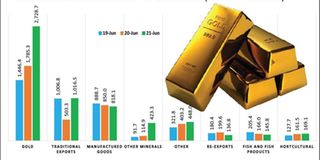Tanzania reaps big as global gold prices soar to 9-year highs

What you need to know:
Tanzania earned $2.72 billion from gold exports in the year that ended on July 31, 2020 - up from the $1.78 billion earned in the corresponding period in 2019
Dar es Salaam. The rising prices of gold on the international market good news for Tanzania - what with latest figures showing that the country’s foreign exchange earnings from the mineral rose by close to $1 billion in just one year.
On a month-to-month basis, Tanzania earned $266.8 million in July 2020 alone from gold exports, compared to the $129.4 million that was earned in July 2019, a new report by the Bank of Tanzania (BoT) shows.
Gold exports increased by 52.8 percent during the year to July 31, 2020.
The country earned $2.72 billion in the year that ended on July 31, 2020 from gold exports, up from the $1.78 billion earned in the corresponding period in 2019.
Gold officially overtook tourism as the country’s major foreign exchange earner in May, 2020.
A total of $2.5 billion in gold exports was registered during the year ending May, 2020 when the global price for the minerals stood at $1,531.37 per troy ounce.
On a month-to-month basis, BoT says, gold prices at the world commodity market surged by 6.6 percent from $1,732.2 per troy ounce in June 2020, to $1,846.5 per troy ounce in July 2020.
“Similarly, gold price increased to its highest level since September 2011 at $1,772.1 per troy ounce—averaging $1,846.5 per troy ounce in July 2020,” according to BoT.
It states that the rise in gold prices was because the commodity has become an increasingly popular alternative investment due to Covid-19 pandemic-related uncertainty.
Gold, along with horticultural products, pushed earnings from non-traditional goods export higher to $4.86 billion in the year ending July 2020 from $3.68 billion in the corresponding period in 2019.
BoT says earnings from traditional exports such as cotton, sisal, cashew nuts, coffee, tea, tobacco and cloves doubled to $1 billion from $503.3 million in the corresponding period in 2019.
“The increase in the value of sisal export was on account of both volume and price in the world market. Export values of cashew nuts, cotton and cloves rose due to improved export volume, on account of production increase,” BoT report reads in part.
By contrast, export values for coffee and tea declined due to low export volume and prices in the world market.
Receipts from the service sector went down to $3.38 billion in the year ending July 2020 compared with $4.15 billion recorded in the year ending July 2019, owing to a decrease in travel receipts.
Travel receipts declined by 25.8 percent to $1.88 billion due to a decrease in number of tourist arrivals because of suspension of international flights and lockdowns in major tourist source markets.
Nevertheless, travel receipts remained significant in service receipts, accounting for 55.7 percent.




